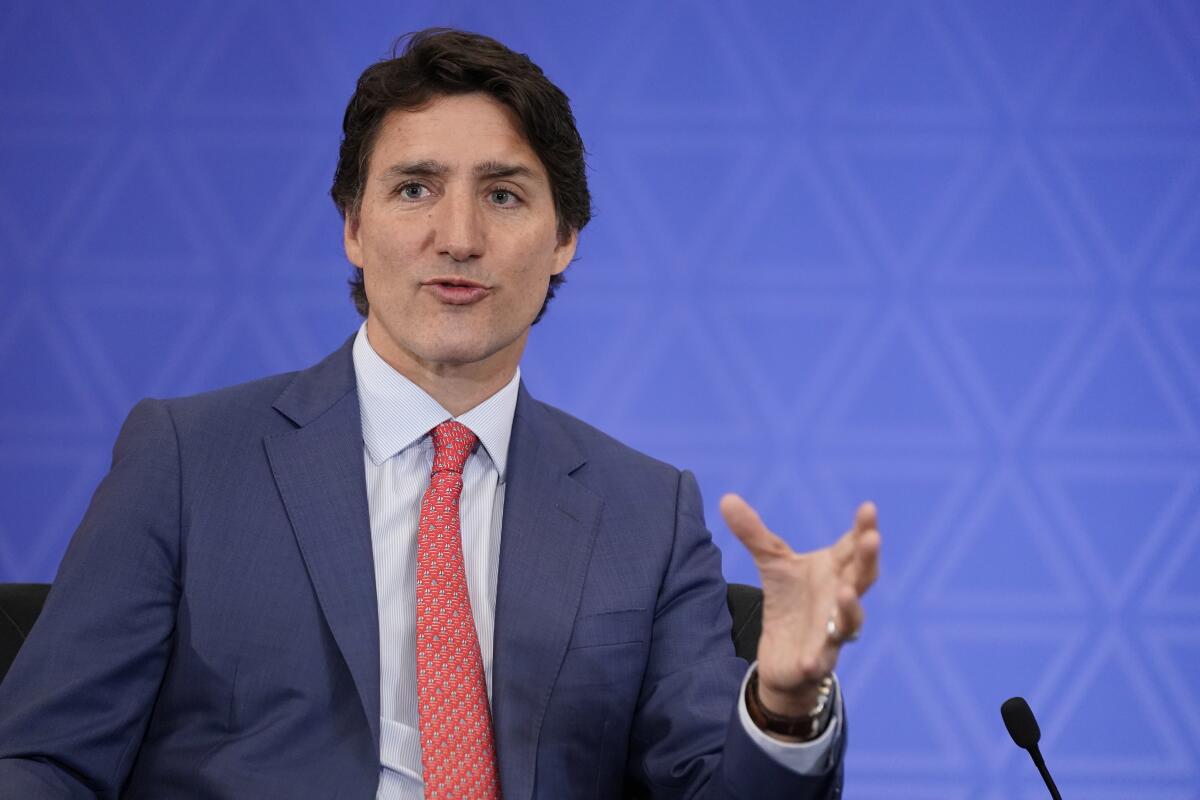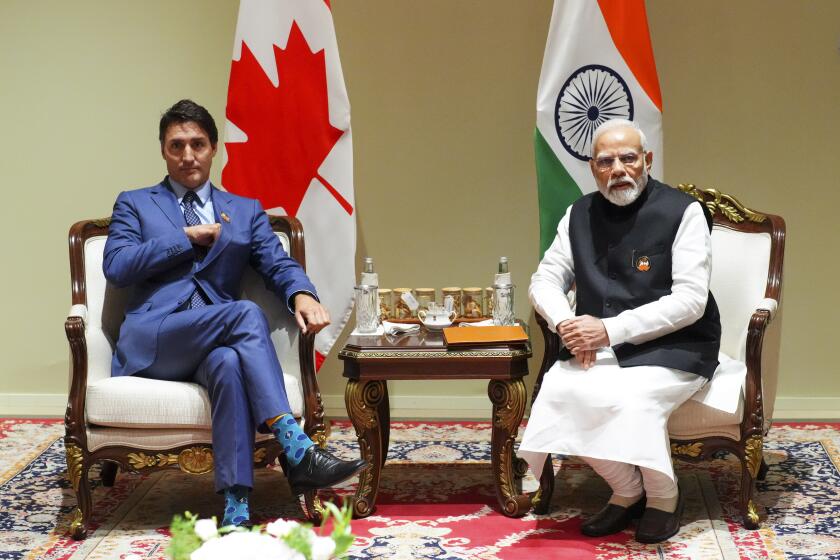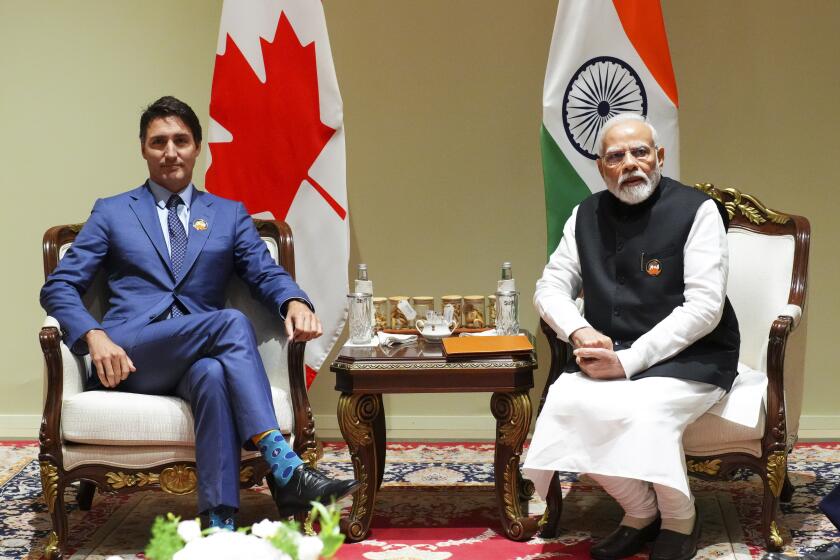Pakistan Minister Bilawal Bhutto Takes Pro-Canada Stand
By Madhuri Adnal | Published: Friday, September 22, 2023
Following Canada's accusation of India's involvement in the killing of a Sikh separatist leader within Canadian borders, Pakistan's former foreign minister Bilawal Bhutto Zardari asserted on Tuesday that it was time for the global community to acknowledge India as a "rogue Hindutva terrorist state."
Speaking to the media, PPP Chairman and former foreign minister Bilawal urged the interim Foreign Office to take note of the incident and issue a "clear" statement. Pakistan's former foreign minister Bilawal Bhutto Zardari
He emphasized that Canada had made a significant accusation against India, exposing India's actions to the world.
Bilawal Bhutto-Zardari went on to say, "For how long will the international community, especially our Western allies, continue to turn a blind eye to such incidents involving India? It is high time for the international community to recognise India as a rogue Hindutva terrorist state."
Amid Online Threats To Hindus He pointed out that India has not only been involved in acts of terrorism in occupied Kashmir, and its spies have been apprehended for involvement in terrorism in Pakistan, but now it has been caught violating the sovereignty of a NATO member state.
"This is not just a breach of Canadian sovereignty; it is a violation of international law and norms. The PPP urges Pakistan to call upon the international community to support the people of Canada and shed light on the atrocities committed by the religio-fascist regime that India has become today," Bilawal Bhutto-Zardari concluded.
Synopsis
Tensions between India and Canada have heightened over the murder of a Khalistani activist, leading to concerns among Indian parents and families residing in Canada. The Indian government has suspended the issuance of visas in Canada, while Canadian PM Justin Trudeau has called for cooperation in the investigation into the murder. However, immigration lawyers believe that there will be no long-term impact on Canadian immigration.
Tensions between India and Canada have escalated through this week over blames of a Khalistani activist's murder, worrying parents and families of Indian nationals in a far-off country as much as the country’s lawmakers brood over the flaring issue.
Relations between the two countries worsened when on Thursday India suspended the issuance of visas in Canada, citing operational reasons. Canadian PM Justin Trudeau went on to call on the Indian government to cooperate with an official probe into the murder of Khalistani separatist leader Hardeep Singh Nijjar in British Columbia.
However, though the situation is unlikely to alleviate overnight, immigration lawyers in Canada believe that there’s almost nothing to worry about in the long term.
Some Indo-Canadians of Sikh background are already saying they don’t feel as safe in Canada as they once did, says Ravi Jain, Canada-based immigration lawyer and founder of Jain immigration, though Trudeau’s move did not surprise some in Canada’s Sikh community.
“Some leaders of this community are already indicating that they are not surprised by the Prime Minister’s announcement. Others of Indian descent will find the nature of the allegations shocking,” Jain said.
The most recent census reveals that there are 7,70,000 Indo-Canadians who identify as Sikhs in terms of their religion, while some of them support Khalistan.
Elizabeth Long, Partner at Long Mangalji LLP and a specialist in immigration Law, told ET that the diplomatic ties would not really have an effect on Canadian immigration.
“The presence of Indian nationals or people of this descent in Canada is very strong. They contribute to the Canadian economy and politically too, to quite an extent. However, keeping in mind the recent diplomatic relationship, it is not expected to have any effect on immigration,” Long explained.
It would be unconstitutional if the government here limits people based on nationality, she added.
As for Canada, it is not immune from racist attacks based on world events. Asians in Canada were targeted by some intolerant Canadians for the Covid-19 pandemic.
Anxious Parents
Parents of Indian students currently enrolled in Canada are also anxious for their kids’ safety.
“Concerns among families are growing, not only for those students who have already departed for Canada but also for those currently studying there. In the event of escalating geopolitical tensions, these concerns are expected to rise further," Collegify co-founder Adarsh Khandelwal told ET.
For someone from India, if this would be a right time to pursue education in Canada, Saurabh Arora, CEO and Founder of University Living ,believes it is essential for students to adopt a patient and informed approach.
“Rushed judgments based on isolated events aren’t advisable. Both governments will implement measures to address the situation. Caution is warranted, but panic should be avoided,” he added.
Further, Arora advised that students should stay updated and exercise patience as the situation unfolds, ensuring they make informed decisions regarding their education in Canada.
According to data from Immigration, Refugees and Citizenship Canada, a record 2,26,450 Indian students went to study in Canada last year. Indian students accounted for 41 per cent of the 5,51,405 students from 184 countries who entered Canada in 2022.
By Rhea Mogul and Manveena Suri,
New Delhi CNN —
India has called Canada a “safe haven for terrorists” following its suspension of visas for Canadian citizens, as the fallout grows over Ottawa’s accusation that New Delhi is potentially behind the assassination of a Sikh separatist activist on its soil.
In a strongly worded statement to reporters Thursday, India’s foreign ministry spokesperson Arindam Bagchi said Canada needed to “worry about its international reputation” in the wake of its explosive allegations.
He added: “If you’re talking about reputational issues and reputational damage, if there’s any country that needs to look at this, I think it’s Canada and its growing reputation as a place, as a safe haven for terrorists, for extremists, and for organized crime.”
His comments followed India’s move to suspend visa applications for Canadian citizens over what it says are “security threats” against diplomats in the country.
“The issue is of incitement of violence, the inaction by the Canadian authorities, the creation of an environment that disrupts the functioning of our high commission and consulates, that’s what’s making us stop temporarily the issuance of visas or providing visa services,” Bagchi added.
India suspends visas for Canadian nationals as diplomatic spat deepens
Relations between the two countries plummeted this week after Canadian Prime Minister Justin Trudeau said India was potentially behind the June killing of Hardeep Singh Nijjar, a Sikh separatist activist, who was gunned down by two masked men in Surrey, British Columbia.
India has vehemently denied the claims, calling them “absurd and motivated.” Bagchi said Canada has provided “no specific information” to support the allegations.
India’s Ministry of Information and Broadcasting on Thursday issued an advisory to television channels, asking them to refrain from “giving any platform to persons who are facing serious charges, such as terrorism or belonging to organizations proscribed by law.”
The Indian government has long accused Canada of inaction in dealing with what it says is Sikh separatist extremism aimed at creating a separate Sikh homeland that would be known as Khalistan and include parts of India’s Punjab state.
Nijjar was an outspoken supporter of the creation of Khalistan. India considers calls for Khalistan a grave national security threat.
A number of groups associated with the idea of Khalistan are listed as “terrorist organizations” under India’s Unlawful Activities (Prevention) Act (UAPA). Nijjar’s name appears on the list of UAPA terrorists and in 2020, the Indian National Investigation Agency accused him of “trying to radicalize the Sikh community across the world in favor of the creation of ‘Khalistan.’”
Several Sikh organizations overseas say the movement is being falsely equated with terrorism by the Indian government, and say they will continue to peacefully advocate for the creation of Khalistan, while bringing to light what they say is years of human rights abuses faced by the community in India.
The history of Khalistan
Sikhs once had their own kingdom in the Punjab and the push for the creation of Khalistan dates back decades, to around the time India gained independence from its British colonial rulers in 1947.
When Partition hastily divided the former colony along religious lines – sending Muslims to the newly formed nation of Pakistan, and Hindus and Sikhs to newly independent India – Punjab, which was sliced in half, saw some of the worst violence.
Sikhs suffered heavily in the ensuing bloodshed, and the community felt mistreated in the new Hindu-majority nation, prompting some prominent leaders to advocate for the creation of Khalistan. Over the years, violent clashes have erupted between followers of the movement and the Indian government, claiming many lives.
In the 1980s, Punjab witnessed a decade-long insurgency by some Khalistani militants, who committed a series of human rights abuses, including the massacre of civilians, indiscriminate bombings and attacks on Hindus, according to Human Rights Watch.
Canada and India are enmeshed in an unprecedented diplomatic row. Here's how it happened
In counterinsurgency operations, Indian security forces arbitrarily detained, tortured, executed, and “disappeared” tens of thousands of Sikhs, the rights group said. The Indian government also enacted counterinsurgency legislation that facilitated human rights violations and shielded security forces from accountability for these violations, it added.
In 1984, then-Prime Minister Indira Gandhi ordered Indian troops to storm Amritsar’s Golden Temple – Sikhism’s holiest shrine – to kill Sikh separatists, in an operation that caused huge anger within the Sikh community.
Gandhi was assassinated by her Sikh bodyguards in the aftermath, prompting a renewed bout of violence that killed more than 3,000 people, mostly Sikhs.
A year later the violence spilled over to Canada, when Sikh separatists bombed an Air India plane that had taken off from Toronto airport, killing all 329 people aboard, including numerous Canadians of Indian descent.
The Khalistan movement now
There is no insurgency in Punjab today and analysts say supporters of the Khalistan movement remain very much on the margins in India.
However, the movement continues to evoke a level of sympathy from some Sikhs within the global diaspora, particularly in Canada, Britain and Australia.
A small but influential number of those Sikhs support the idea of Khalistan, with referendums periodically held to reach a consensus to establish a separate homeland.
Nijjar’s death shocked and outraged many within the Sikh community in Canada, which has more than 770,000 members and is one of the largest outside India.
Canadian police have not arrested anyone in connection with Nijjar’s murder. But in August, police said they were investigating three suspects and issued a description of a possible getaway vehicle, asking for the public’s help.

Canadian Prime Minister Justin Trudeau, seen in January, set off a diplomatic crisis this week when he said there were “credible allegations” that India was involved in the fatal shooting of a Sikh separatist outside Vancouver in June.
(Andrew Harnik / Associated Press)
BY ROB GILLIES
ASSOCIATED PRESS
TORONTO —
The allegation of India’s involvement in the killing of a Sikh Canadian is based on surveillance of Indian diplomats in Canada, including intelligence provided by a major ally, a Canadian official told the Associated Press on Thursday.
The official said that the communications involved Indian officials and Indian diplomats in Canada and that some of the intelligence was provided by a member of the “Five Eyes” intelligence-sharing alliance, which consists of the U.S., Britain, Australia, New Zealand and Canada.
The official did not say which ally provided intelligence or give details of what was contained in the communications or how they were obtained. The official spoke on condition of anonymity because they were not authorized to discuss the matter publicly.
The Canadian Broadcasting Corp. first reported the intelligence.
The revelation came as India stopped issuing visas to Canadian citizens and told Canada to reduce its diplomatic staff in India as the rift widened over allegations by Prime Minister Justin Trudeau of suspected Indian involvement in the killing of Hardeep Singh Nijjar, a 45-year-old Sikh separatist, in British Columbia, Canada.

Canada gets only muted allied support in its faceoff with India over slain activist
Sept. 21, 2023
Ties between the two countries have plunged to their lowest point in years after Trudeau told Parliament on Monday that there were “credible allegations” of Indian involvement in Nijjar’s fatal shooting.
Nijjar, a plumber who was born in India and became a Canadian citizen in 2007, had been wanted by India for years before he was gunned down in June outside the temple he led in Surrey, a suburb of Vancouver.
Speaking Thursday on the sidelines of the United Nations General Assembly, Trudeau acknowledged the complicated diplomatic situation.
“The decision to share these allegations on the floor of the House of Commons was not done lightly,” he said. “There is no question that India is a country of growing importance and a country that we need to continue to work with.”
“We are not looking to provoke or cause problems, but we are unequivocal around the importance of the rule of law and unequivocal about the importance of protecting Canadians.”

India tells citizens to be careful if traveling to Canada as rift widens over Sikh leader’s death Sept. 20, 2023
The bombshell allegation set off an international tit-for-tat, with each country expelling one of the other’s diplomats. India called the allegations “absurd.”
Canada has yet to make public any evidence to back Trudeau’s allegations, and Canada’s ambassador to the U.N., Bob Rae, indicated that that might not come soon.
“This is very early days,” Rae told reporters Thursday, adding that the facts will emerge but must “come out in the course of the pursuit of justice.”
“That’s what we call the rule of law in Canada,” he said.
Meanwhile, the company that processes Indian visas in Canada announced that services had been suspended. Canadians are among the top travelers to India, with 277,000 Canadian citizens visiting the country in 2022, according to India’s Bureau of Immigration.
Indian External Affairs Ministry spokesperson Arindam Bagchi blamed the visa suspension, which includes visas issued in third countries, on safety issues.
“Security threats being faced by our high commission and consulates in Canada have disrupted their normal functioning,” Bagchi told reporters. He gave no details on the alleged threats.
The announcement quickly rippled across Canada, especially among people with ties to India.
Maitreyi Bhatt, a 27-year-old Indian citizen whose partner is Canadian and needs a visa, was distraught because their wedding was scheduled for late October in India, where he was to meet her family for the first time.
“I’ve been crying all day,” she said. “It’s so difficult. I was just so excited for him to meet my family.”
She said the venue is booked and the couple has nonrefundable flights. She said her partner went to the Indian Consulate in Toronto but was escorted out by security.
“People like me are just caught up in this, and it’s just not fair,” she said.
The Canadian High Commission in New Delhi said Thursday that its consulates in India were open and continue to serve clients. It said some of its diplomats had received threats on social media, and that Canada expects India to provide security for Canadian diplomats and consular officers working there.
India has criticized Canada for years over giving free rein to Sikh separatists, including Nijjar. New Delhi had accused him of links to terrorism, which he denied.
Nijjar was a local leader in what remains of a once-strong movement to create an independent Sikh homeland known as Khalistan. A bloody Sikh insurgency shook north India in the 1970s and 1980s until it was crushed in a government crackdown in which thousands of people were killed, including prominent Sikh leaders.
At the time of his killing, Nijjar was working to organize an unofficial Sikh diaspora referendum on independence from India.
No comments:
Post a Comment